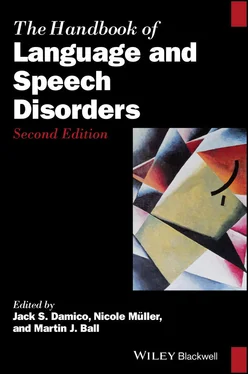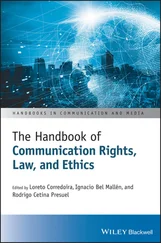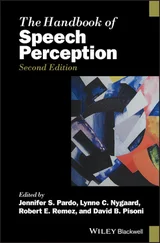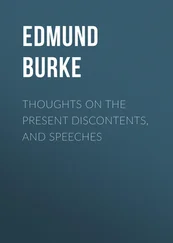Holly Damicois an Associate Professor at the University of Louisiana at Lafayette, and a Hawthorne‐BoRSF Endowed Professor. She co‐founded and co‐directs the Summer Language and Literacy Project. Her clinical and research interests include language and literacy acquisition and intervention as contextualized and social transactional processes, with a focus on qualitative research methods. She has authored and co‐authored 18 peer‐reviewed book chapters and articles in those areas. She received the 2017–18 Rising Star Researcher Award in Liberal Arts at UL Lafayette.
Jack S. Damicois a clinical linguist and a speech‐language pathologist with a Master’s degree in communicative disorders and a PhD in linguistics. With over 12 years of clinical experience as a speech‐language pathologist in the public schools, medical settings, and in private practice, his research focuses on the authentic implications for individuals with atypical language and communication skills, and on the development of clinical applications to assist in overcoming communicative problems. Working primarily in the areas of aphasia in adults and language and literacy difficulties in children from both monolingual and bilingual backgrounds, he specializes in the utilization of various qualitative research methodologies to investigate language and communication as social action. An ASHA Fellow, he is the co‐editor of the Journal of Interactional Research in Communication Disorders . He has recently joined the University of Colorado Boulder faculty after 28 years as the Doris B. Hawthorne Eminent Scholar Chair at the University of Louisiana at Lafayette.
Kathryn D. R. Drager, PhD, CCC‐SLP, is a Professor of Communication Sciences and Disorders, and Associate Dean for Research and Graduate Education in the College of Health and Human Development, at the Pennsylvania State University. Her research interests include AAC for individuals with severe expressive communication disorders, especially for children, adolescents, and adults with severe disabilities who are at the beginning stages of communication, including children with autism. She is also interested in issues faced by the global community in AAC. She has more than 60 publications and over 160 presentations at local, national, and international conferences. She has served several terms and is currently on the Associate Editor board of Augmentative and Alternative Communication .
Erinn H. Finke, PhD, CCC‐SLP, is an Associate Professor of Audiology and Speech Pathology, at the University of Tennessee Health Science Center. Her research is focused on understanding and improving friendship outcomes and interactions for individuals with autism spectrum disorder, including those who use augmentative and alternative communication. She is also interested in how technology (games and applications) can be used to provide a supportive context for social interactions. She has more than 20 publications and over 60 presentations at local, national, and international conferences. She is currently a Section Editor for the American Journal of Speech‐Language Pathology .
Paul Fletcheris Emeritus Professor of Speech and Hearing Sciences, University College Cork, Ireland. He previously held professorial positions at the University of Reading and the University of Hong Kong. He has published widely on language development and language impairment in children learning English, and more recently in children acquiring Cantonese and Mandarin. His primary research interest is the acquisition of grammar, but he has also worked on vocabulary, particularly the assessment of vocabulary development in young children via parent report. He is a past president of the International Association for the Study of Child Language, and an honorary member of the Irish Association of Speech and Language Therapists.
Martin Fujikiis professor emeritus at Brigham Young University (BYU), Provo, Utah. His work focuses on social competence in children with developmental language disorders. Dr Fujiki has been a professor at the University of Nevada and BYU, and a research scientist at the Schiefelbusch Institute for Lifespan Studies, University of Kansas. He is a fellow of the American Speech‐Language‐Hearing Association and received Honors of the Association in 2015.
Robert Brinton Fujikiearned a BFA in Music‐Dance Theater and an MS in Communication Disorders from Brigham Young University. He is currently a PhD candidate at Purdue University. He has clinical and research experience in voice and swallowing disorders in adults and children.
Sandra L. Gillamis a Professor in the Department of Communicative Disorders and Deaf Education at Utah State University, and a past Vice President for Speech Language Pathology Practice for the American Speech Language Association. She holds a PhD from the University of Memphis. Her research interests include assessment and intervention of language and literacy impairments, multicultural populations, and processes involved in text comprehension. Sandi was the PI on a Goal II IES grant to develop narrative intervention procedures, and is currently Co‐PI on a Goal III grant to conduct a randomized controlled trial of the narrative program.
Katarina L. Haley, PhD, CCC‐SLP, is Professor in the Division of Speech and Hearing Sciences, Department of Allied Health Sciences, University of North Carolina School of Medicine. She holds PhD and MS degrees from Vanderbilt University in Nashville, Tennessee, and a BS from Karolinska Institutet in Stockholm, Sweden. She teaches courses on neurological communication disorders, particularly aphasia. She specializes in assessment and treatment of adults with left hemisphere brain lesions. Her research focuses on speech production, apraxia of speech, development of quantitative speech assessment procedures, and client‐centered treatment.
Archie B. Harmonis an Assistant Professor of Otolaryngology at Washington University School of Medicine in St Louis. Dr Harmon is a fellowship‐trained speech pathologist with clinical expertise in voice therapeutic outcomes, the aging larynx, and paradoxical vocal fold motion. His research interests include voice treatment adherence and voice therapy outcomes.
Ingo Hertrichis Professor at the University of Tübingen, Germany, working as lecturer in phonetics and phonology at the Linguistics Department, and researcher in Neurobiology of Language at the Department of Neurology and Stroke and the Hertie Institute for Clinical Brain Research. He holds a PhD from the University of Munich in physical anthropology. He has published in the fields of acoustic phonetics, kinematic analysis of speech articulation, voice analysis, magnetoencephalography, functional magnetic resonance imaging, and transcranial magnetic stimulation. These studies considered various clinical aspects, but also included experimental work with healthy subjects in order to contribute to a functional‐anatomic model of speech and language processing in the brain.
Sarai Holbrookis an assistant professor in the School of Communication Sciences and Disorders in the College of Professional Studies at the University of Wisconsin‐Stevens Point. She holds the Certificate of Clinical Competence in speech‐language pathology from the American Speech‐Language‐Hearing Association. Her research interests include assessment and intervention for social communication in children with autism spectrum disorder, language intervention for children with developmental language disorder, and the scholarship of teaching and learning.
Katherine C. Hustad, PhD, CCC‐SLP, is Professor of Communication Sciences and Disorders at the University of Wisconsin – Madison. She is also an investigator at the Waisman Center. Professor Hustad’s research focuses on characterizing and enhancing speech, language, and communication development and outcomes in children with cerebral palsy. She also studies variables that influence speech intelligibility, with a special emphasis on augmentative/alternative communication interventions. A primary objective of her work is to generate a theoretically driven, data‐based longitudinal model of speech and language development in cerebral palsy that can be used to predict outcomes, develop and test interventions, and guide treatment decisions. Professor Hustad has a strong interest in bridging research with clinical practice. Her work has been funded by the National Institutes of Health, National Institute on Deafness and other Communication Disorders (USA) since 2003. She is a fellow of the American Speech, Language, and Hearing Association.
Читать дальше












